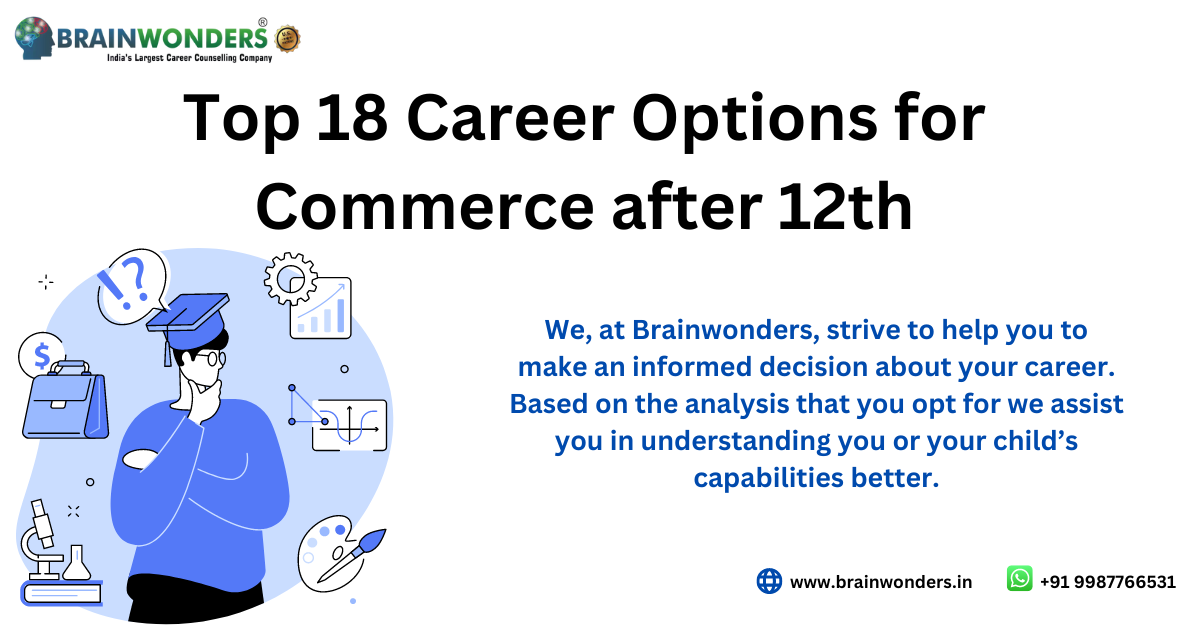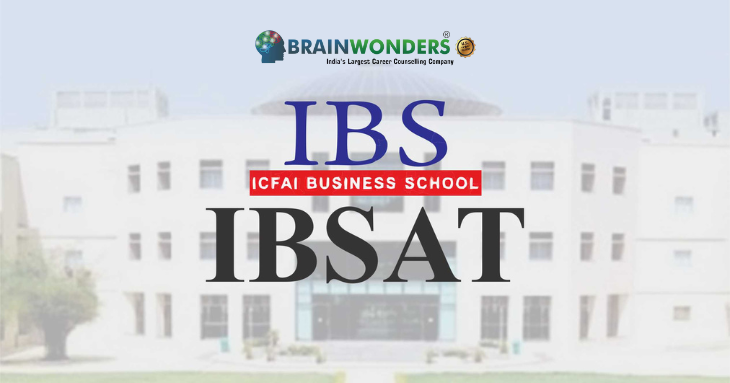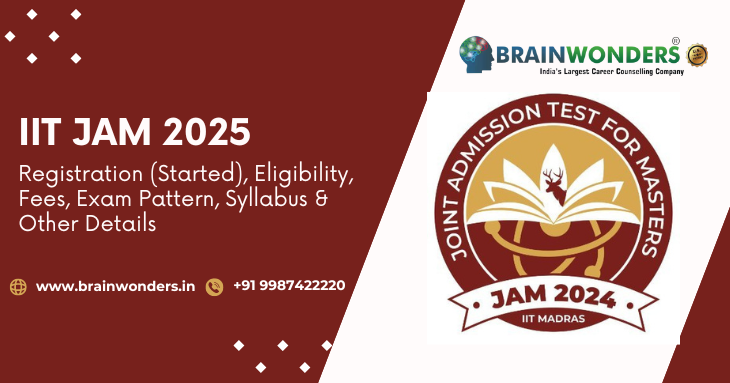

Are you aware which subjects and courses will bring you closer to your dream career?
Worry not, because the Brainwonders test and guidance will not only help you know it, but also follow it!
Blog
23 February,2024 | By Brainwonders

Completing class 12th is achieving a new milestone for students. However, to proceed to the next milestone, students must have a clear decision and all the required knowledge about the field they want because one wrong decision might be disastrous for them.
Every student needs clarification about the streams from commerce since science is generally known to be taken by medical or engineering aspirants. But, What about commerce students?
Chartered accountancy courses offered by the Institute of accountants of India (ICAI). CA is divided into three levels, with three years of practical training required after graduating high school. A chartered accountant is a professional who works as a financial controller in business and other industries. After five years, accounting professionals can handle accounting, taxation, filing returns, taking care of financial statements of companies and individuals, and maintaining records.
Must Read: Everything you need to know about becoming a CA.
Career Options after CA: Tax auditing, finance manager, financial advisor, financial analyst, public accountant, cost accountant, government accountant, taxation expert, etc.
The Institute of Company Secretary of India (ICSI) offers the course to be a company secretary. To become company secretary after the 12th, you must qualify for an entrance exam, CSEET conducted nationally. CS is offered in three programs - Foundation, Executive, and Professional. Each program lasts for a year.
Career Options after CS: Assistance to the board of directors, company registrar, legal advisor, corporate policy maker, chief administrative officer, principal secretary, corporate planner, chairman, managing director, etc.
Toughest Courses in the World to Study.
Financial management is the business function that invests valuable financial resources in a way that leads to tremendous business success, and a return on investment is achieved. Various certifications are available in financial management, such as Certified Financial Planner (CFP), Chartered Financial Analyst (CFA), Financial Risk Manager (FRM), and Certified Public Accountant (CPA).
Career Options in financial management: Payroll Associate, financial officer, financial advisor, etc.
Investment banking is a type of Banking that organises large complex financial transactions such as mergers or initial public offerings. Investment banking deals with raising money for companies, the government, and other entities. To become an investment banker, CFA certification is required.
Career Options in Investment banking: sales and trading, banking, and financial markets.
The primary role of a financial analyst is to pore over data to identify opportunities or evaluate outcomes for business decisions or investment recommendations. A master's in finance, an MBA, or CFA can help you become a financial analyst.
Career Options: Insurance Companies, security firms, mutual fund companies, etc.
Tourism is a part of the hospitality industry, and a course in tourism management prepares the candidate for a management position in the food, accommodation, and tourism industry. The system is operated at every level, from Bachelor to Diploma and doctorate.
Students can also choose courses such as adventure tourism, air ticketing, Agri tourism, rural tourism, travel management, and hospitality management.
Must Read: Tourism management eligibility criteria in India.
Civil services are amongst India's highest-paid, respected, and prestigious professions. Only 30%-40% of the students fulfill their dream of becoming civil servants in India.
Career options as a Civil Servant: An individual can become any one of the civil servants depending upon the exam scores and interview:
Business Management is the coordination and organisation of business activities. In this field of education, one learns about the establishment of a company or an organisation and various functional levels such as production, financial, administrative, human resources, etc.
Career options: Business Management offers various jobs with handsome salaries, such as process improvement manager, business operations manager, business operations manager, business product manager, business manager, and business analytics.
Statistics is the collection of data, sampling it, observing it accurately, and then representing the state using various theories and methods. Students who want to study statistics must be good at logic, reasoning, and mathematics.
Career options: Candidates can take a government job exam after completing a degree course in statistics or take Indian statistical service exams where there are various jobs. Also, statistics graduates include statisticians, consultants, professors, analysts, data analysts, business analysts, mathematicians, data scientists, and biostatisticians.
Law is an official rule of a country or state that says what people may or may not do.
A career in law requires one to put in overtime efforts in legal research. It is one of the most respectful courses to study. Individuals with good intellect, persuasion skills, sound judgment of situations and people's ability to argue on a topic, interest in research, confidence, mental and physical stamina, and ability to analyse facts can pursue this course.
Career options: Aspirants can choose from criminal or civil specialisation in law. They can also have fields in cyber law, patent law, commercial law, litigation, family law, and corporate law.
Find out: Top Bachelor Of Law Recruiters in India.
BCA, or bachelor's of computer applications, is an undergraduate course that gives the knowledge of computer language students. After completing this course, students can build a career in information technology and computer applications. Moreover, they can also find jobs as a web designer, system manager, software developer, computer programmer, web developers, software developers, etc., depending on the skills and languages they learn at the time of BCA. The typical salary of an average BCA fresher starts from around 2.5 lakh per annum to 12 lakh per annum. Students from both science and non-science departments can pursue BCA.
Career Options:
Psychology is the study of human behaviour. Students in psychology get to explore human behaviour in varied contexts such as individual, social, psychological, industrial, etc. A career in psychology requires you to be an excellent observer and communicator, along with an investigative streak. There are various branches of Psychology that can be chosen as a career field, such as
Career Options:
Hotel management is a good option for those looking for a professional career in the hospitality industry—a hotel management office where job opportunities facilitate quality service at hotels. This course includes food and beverage management, front desk execution, accounting, and housekeeping.
Career Options: Hotels, Resorts, Airlines, Corporates, Executive chef, Clubs, Entrepreneur, and Food chains.
Recommended Read: Hotel Management and Top Colleges in India.
Commerce is the exchange of goods and services among two or more parties which requires their transportation from one place to another on a large scale. The Commerce field opens many career options, B.Com, BBA, BCA, BMS, CA, CS, and Full-stack Developer.
Career Options in Commerce: IT Sector, Banks, Companies, Private or Public Sector firms, civil services, etc.
Foreign Trade is exchanging capital, goods, and services across international borders or territories. Foreign Trade is essential to continue globalisation.
Career Options in Foreign Trade: Relationship manager, foreign Trade manager, export manager, foreign Trade analyst, etc.
Banking is the business of protecting money for others. Banks lend this money, generating interest that profits the bank and its customers. A bank is a financial institution licensed to accept deposits and make loans. But they may also perform other financial services.
Career Options in Banking: Auditor, Banker, Financial analyst, loan officer, investment banker, budget analyst & broker.
Actuarial Science is a discipline that assesses financial risks in the insurance and finance fields using mathematical and statistical methods. The extensive study of actuarial science and standardisation of the analysis enables an actuary to adopt a problem-solving approach.
Career Options in actuarial science: Investment consultant, life and health insurance, pension funds, etc.
Cost accounting is a form of managerial accounting that aims to capture a company's total cost of production by assessing the variable costs of each step of production and fixed costs, such as a lease expense.
Career Options in Cost Accounting: Statistician, professor, business analyst, data analyst, risk analyst, etc.
Recommended Reads:
List of Mandatory and Optional Subjects in Commerce.
FAQs:
1. What is the best subject for commerce students?
Ans: Every subject is good in its respect. However, the sole decision is made on the student's interest in a particular field.
2. What are the normal subjects offered in class 11th commerce?
Ans: Accountancy, Economics, Business, and English are the compulsory subjects in class 11th commerce.
3. Which is the highest paying job in the commerce department?
Ans: CA is one of the highest-paying jobs in the commerce department.
Worry not, because the Brainwonders test and guidance will not only help you know it, but also follow it!



,_Syllabus,_Pattern,_Old_Question_Papers.png)

